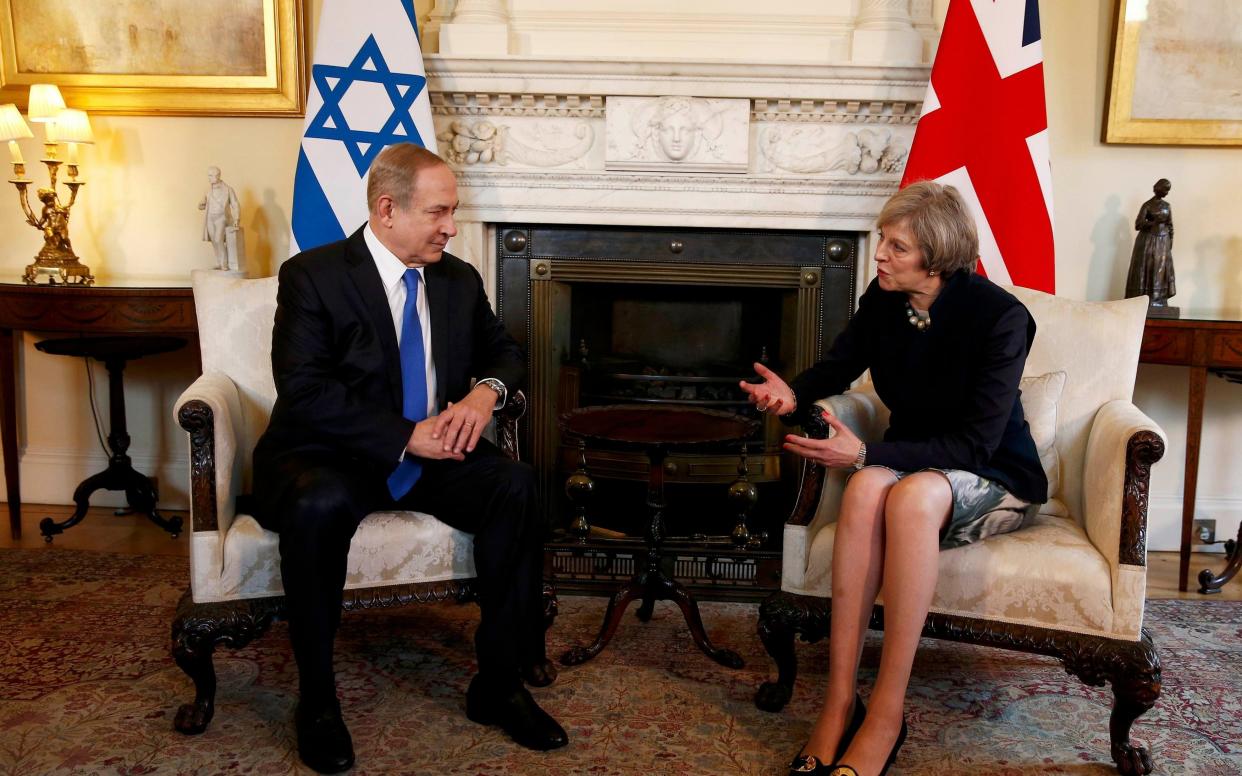Netanyahu to brief Theresa May on Israeli intelligence on Iran's nuclear programme

Benjamin Netanyahu is expected to brief Theresa May soon on Israeli intelligence about Iran’s nuclear weapons programme, as the UK said it had “never been naive about Iran” but still supported the 2015 nuclear agreement.
A spokesman said the Israeli prime minister plans to call Mrs May to discuss what Israel says is a trove of stolen Iranian documents which “conclusively prove” that Iran lied about its nuclear ambitions before and after the landmark nuclear deal.
Mrs May and Mr Netanyahu have consistently disagreed over the future of the Iran deal, with the prime minister and other European leaders supporting it while Mr Netanyahu has called for it to be either strengthened or scrapped.
Mrs May, along with Emmanuel Macron and Angela Merkel, have been urging Donald Trump not to pull the US out of the agreement on May 12, when he faces a deadline over reimposing American sanctions on Iran. Mr Netanyahu has been pushing the US president in the other direction.
Mr Netanyahu has already briefed Mr Trump, Mr Macron, Mrs Merkel and Vladimir Putin on the Israeli intelligence. A spokesman said he planned to speak soon with both Mrs May and Xi Jinping, the president of China.
A Downing Street source said Tuesday morning that no call between Mrs May and Mr Netanyahu had yet been scheduled.
FAQ | Iran nuclear talks
Iran’s foreign ministry denounced Mr Netanyahu as a "broke and infamous liar who has had nothing to offer except lies and deceits”. Iran has always said publicly it never planned to make a nuclear weapon that and its atomic programme was entirely peaceful.
Hours after Mr Netanyahu made his theatrical presentation at the Israeli defence ministry in Tel Aviv, the Foreign Office released a statement indicating that his speech had not changed Britain’s position on the nuclear deal.
“We have never been naïve about Iran and its nuclear intentions. That is why the IAEA inspection regime agreed as part of the Iran nuclear deal is one of the most extensive and robust in the history of international nuclear accords,” a spokeswoman said.
“It remains a vitally important way of independently verifying that Iran is adhering to the deal and that Iran's nuclear programme is exclusively peaceful.”
France echoed that sentiment, saying that Mr Netanyahu’s presentation only underscored the importance of a robust nuclear agreement to stop Iran from developing a nuclear weapon.
"The pertinence of the deal is reinforced by the details presented by Israel: all activity linked to the development of a nuclear weapon is permanently forbidden by the deal," a foreign ministry spokesman said.
While Mr Netanyahu presented what he said was evidence that Iran had lied about its previous nuclear research, he did not say that Iran was currently violating the terms of the nuclear deal.
The International Atomic Energy Agency (IAEA) as well as senior Israeli and US military officers had said in recent weeks that Iran is complying with the agreement and that the deal has halted Iran’s nuclear weapons development.
Israel has already provided the intelligence to the US, and American officials have assessed it to be “authentic”, according to Mike Pompeo, the US secretary of state. Israel said it was prepared to share the files with the UK and other members of the P5+1 bloc.
Mr Pompeo said he believed that the US would continue to work closely with the UK, France, and Germany even if Mr Trump did scrap the nuclear deal.
“I am confident that we will continue to have good relations with our European partners should the President choose to pull out of this. This will be one issue among many of the important, critical issues that we all work on together,” he said.
Mr Trump said Netanyahu’s speech “has really shown that I’ve been 100 percent right” on the need to take a hardline against Iran.
He refused to say what decision he would make on the fate of the Iran deal on May 12 but has given hints he plans to withdraw.
Mr Macron said at the end of his trip to Washington last week that he expected to Mr Trump to scrap the accord.
"I don't know what the American decision will be but the rational analysis of all President Trump's statements does not lead me to believe that he will do everything to stay in,” Mr Macron said.

